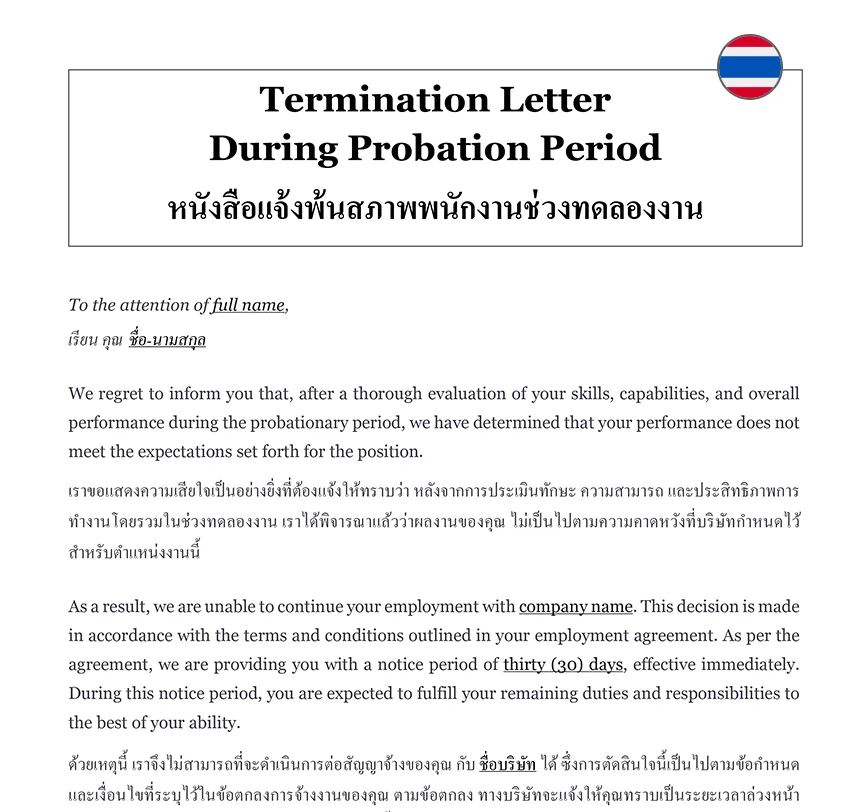Ready to use legal template
Drafted by experienced lawyers
Certified Thai-English translation
Ready to use legal template
Drafted by lawyers
Translated in Thai-English
Learn more about Employee Probation Period Termination
Navigating the termination of an employee’s probation period in Thailand requires careful consideration and adherence to the country’s labor laws. Employee Probation Period Termination can be a sensitive process for employers, necessitating proper documentation and compliance to avoid legal complications. At Themis Partner, we understand the complexities involved in such situations, and our team of expert lawyers has crafted an easy-to-edit legal template tailored to Thailand’s employment regulations. This comprehensive template facilitates a smooth and legally compliant termination process, ensuring that both employers and employees are protected throughout the probationary period termination.
Table of contents
-
What are the reasons for terminating an employee?
-
What should a Probationary Termination Letter include?
-
When must the employer send a letter of dismissal?
-
Is there a notice period required when terminating a probation period?
-
Can a Termination Letter be contested by the employee?
-
How can employers handle probationary terminations professionally?
What are the reasons for terminating an employee?
In Thailand, terminating an employee during the probationary period is generally allowed, but employers must have valid reasons for doing so. The specific valid reasons can vary based on the terms outlined in the employment contract and the company’s internal policies. Here are some common valid reasons for terminating an employee during the probation period in Thailand:
1. Performance Issues: If the employee’s performance during the probationary period does not meet the expected standards or job requirements, the employer may consider termination.
2. Skills and Competence: If the employee lacks the necessary skills or qualifications for the position, termination may be justified.
3. Behavioral Concerns: If the employee displays inappropriate behavior or violates company policies during the probationary period, termination may be necessary.
4. Incompatibility: If there is a clear mismatch between the employee’s abilities and the company’s work environment or culture, termination may be considered.
5. Attitude and Work Ethic: If the employee demonstrates a negative attitude or poor work ethic that affects their ability to perform the job, termination may be warranted.
6. Unreliability or Attendance Issues: Consistent tardiness, absenteeism, or failure to meet work schedules may be grounds for termination.
7. Breach of Contract: If the employee breaches any terms of the employment contract or fails to adhere to probationary conditions, termination may be a valid option.
8. Unsuitability for Continued Employment: If it becomes evident that the employee is not suitable for continued employment within the organization, termination may be considered.
ℹ️ It is essential for employers to document any performance or behavioral issues during the probationary period and communicate with the employee about areas that need improvement. You can download our Employee Performance Evaluation template to effectively review your employees.
What should a Probationary Termination Letter include?
A probationary termination letter should be clear, concise, and professional. It should include the following key components:
1. Reason for Termination
Provide a brief and specific explanation for the termination. Mention the valid reason(s) based on the employee’s performance, behavior, or suitability during the probation period.
2. Probationary Period Details
Reference the specific dates of the probationary period and any relevant probationary conditions mentioned in the employment contract.
3. Confirmation of Termination
Clearly state that the employee’s employment is terminated, effective from the date mentioned in the letter.
4. Notice Period (if applicable)
If there is a notice period required as per the employment contract or local labor laws, specify the duration of the notice period.
5. Final Pay and Benefits
Mention any outstanding salary, entitlements, or benefits the employee will receive upon termination. Provide instructions on the payment process and any necessary paperwork.
6. Return of Company Property
If the employee was provided with any company property during the probationary period, include instructions for returning those items.
It is crucial to maintain a professional and empathetic tone throughout the letter. The termination letter should be delivered in person whenever possible, and a copy should be retained for the company’s records.
When must the employer send a letter of dismissal?
In Thailand, there are no specific legal requirements regarding the exact timing for sending a Probationary Period termination letter. However, employers are encouraged to act promptly and in a fair manner when making the decision to terminate an employee during the probationary period.
To ensure a smooth and lawful termination process, employers should consider the following guidelines:
| ➤ Performance Evaluation: During the probationary period, employers should closely monitor the employee's performance, behavior, and suitability for the role. If performance or behavior issues arise, the employer should address them promptly and provide feedback to the employee. |
| ➤ Early Communication: If it becomes evident that the employee is not meeting the required standards or is not a good fit for the position, the employer should communicate their concerns early in the probationary period. This gives the employee an opportunity to improve and understand the areas that need development. |
| ➤ Notice Period (if applicable): If the employment contract or company policy requires a notice period for probationary termination, the employer should adhere to the specified duration. |
| ➤ Documentation: Throughout the probationary period, employers should maintain proper documentation of the employee's performance reviews, feedback, and any disciplinary actions taken, if applicable. These records may be important in case of any legal disputes. |
| ➤ Discretion and Fairness: Employers should exercise discretion and fairness when making the decision to terminate an employee during probation. The decision should be based on valid reasons and not be discriminatory in any way. |
| ➤ Dismissal Meeting: Before issuing the Probationary Period termination letter, it is advisable to hold a meeting with the employee to discuss the reasons for termination and provide them with an opportunity to respond or seek clarification. |
| ➤ Formal Written Notice: The termination should be confirmed in writing with a Probationary Period termination letter. The letter should state the date of termination and the reasons for the decision. |




